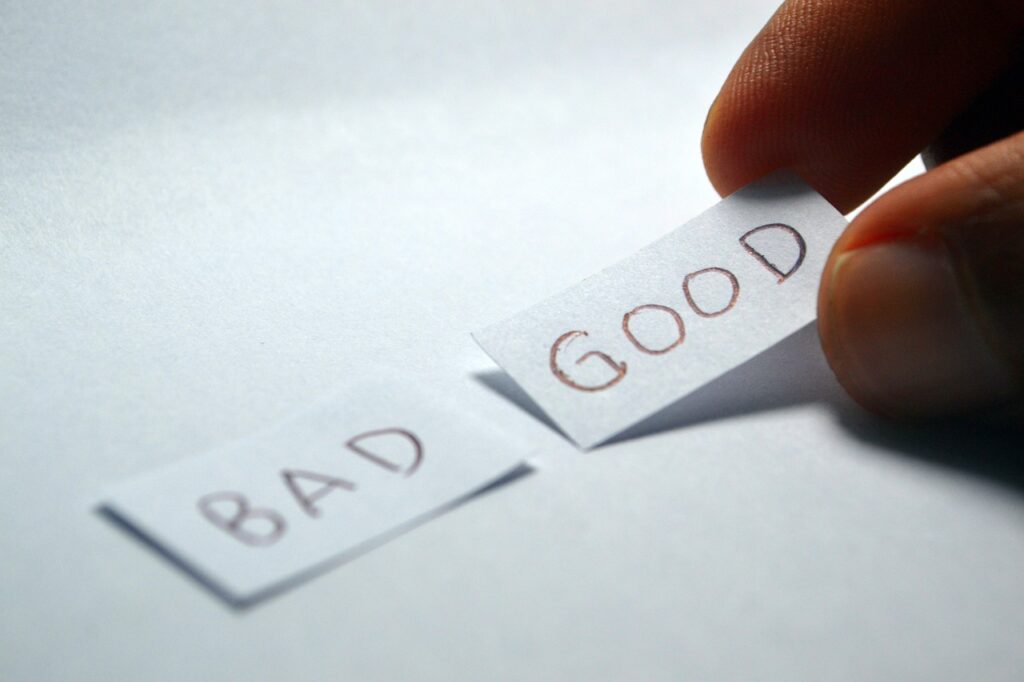Your beliefs form the foundation of your reality and influence your life experience. If your beliefs are rotten to the core, your reality will be too.
If you believe the world is a horrible place and everything sucks, do you think that’s an objective reality, or a personal hell you’ve created for yourself? Maybe you believe life is full of amazing opportunities, adventures, and connections. You’ve created a great life for yourself because your beliefs facilitated that reality.
That’s why you need to do some summer cleaning to discard stubborn belief systems that aren’t serving you, and cultivate healthier ones that make your reality a better place to live in.
Knowing how big of a role belief systems play in the quality of your life, let’s look at how you can identify the beliefs that aren’t serving you, discard them, and construct healthier belief systems that enhance your life experience.
What are limiting belief systems?

A limiting belief system is a restrictive belief that reduces the quality of your life or prevents you from reaching your full potential.
Belief systems help us navigate the world effectively. You’re not going to steal because your belief systems tell you it’s wrong. Perhaps you believe that you can achieve whatever you put your mind to, and this drives you to achieve more.
These are examples of positive beliefs because they encourage you to make the most of your life.
Belief systems are limiting when they prevent you from making the most of your life. View them as cognitive blocks that have developed at some point in your life that prevent you from achieving health, wealth, and happiness.
Are these beliefs inspiring you to do better, or bringing you down?
Most of us have some sort of limiting beliefs. Perhaps these limiting beliefs come in the form of commitment, where you hold yourself back from a stable partnership out of fear that it won’t work out.
Maybe you sabotage good opportunities that come your way because you don’t feel worthy. With all these mental barriers, it can be hard to get anywhere in life, because consciously or unconsciously, you hold yourself back.
Are you a victim of the world, or are you a creator of your reality?
Perception vs belief
Your belief systems are more cognitive than your perception of life.
Perceiving something is an automated and unconscious process, while beliefs often require thought and introspection. Belief systems tend to revolve around the future and future ideals, while perception is momentary, and experienced in the now.
Your perception refers to your understanding of the world via your senses which create a life-like picture of it. Beliefs are a conscious acceptance that something exists or should be done in a certain way.
For example, you might believe that society is moving in a bad direction based on your observations, research, and critical thinking.
You might believe in religion or spirituality, but you might not perceive it because there is no sensory input to validate its existence.
Limiting belief examples
- I’m not good enough to achieve my dreams
- I’m a victim of the world
- People don’t like me
- I need more experience
- I fail at everything I do
- I’m too old/too young to do this
- I’m not smart enough to do that
- I don’t have enough time to do what I want
- I’ll never be successful
- I don’t deserve love
Healthy belief systems
- I can become more intelligent and learn whatever I need to succeed
- I am in control of my life
- I am a valuable asset to any job
- I am already successful, in my own way
- There will always be more opportunities
- Amazing people always come into my life
- Every difficult situation is temporary
- Life will get better
- I am abundant with everything I need
- I will meet the person of my dreams one day
Identifying limiting belief systems
Identifying limiting belief systems starts with an awareness of them.
When I used to think about money, there was a block. Even though I wanted to get ahead financially, I got discouraged. I thought about how much competition there was, and how I could possibly provide any value to others.
Because of this limiting belief system, I avoided a lot of good opportunities that came up, because I didn’t feel I deserved them.
Because of my belief system regarding money, I manifested a lot of issues with it. Every time I started to get ahead, something would come up that separated me from my earnings. I would get cheated on, scammed, and robbed.
So I looked into this belief system and why realistically, I couldn’t do as well as anyone else.
I started spending more, enjoying it more and stopped thinking about how much I needed it. When the need for more money lessened but the value I got out of it improved, things began to change.
As my beliefs surrounding money have become more positive, I have had a lot of amazing adventures in life, and more opportunities in this form keep arising.
Unless you are conscious about what you believe and why you believe it, these negative patterns will remain undetected and continue to control your life.
Cultivate an awareness about your beliefs
Often, we aren’t aware of the beliefs we have. Because we mindlessly reinforce them without ever paying attention to them, they continue doing their dirty work outside the spotlight of awareness.
Therefore, you need to think critically about your belief systems.
This requires you to dig into what you think you’ve known for a long time and start questioning things. Once you identify your beliefs, really think about them, and how strongly you’re holding onto them. Here are some prompts to get the juices flowing:
- How is your relationship with money? Is it abundant and easy to access, or something you just can’t have no matter how hard you try? Do you think money is bad, or it’s just a tool?
- Do you consider yourself a lucky person? Why, why not?
- Do you believe in spirituality? What do you believe happens when you die? What beliefs do you have surrounding death, and how does this translate into your life experience?
- How do you feel about society? Is it going down the shitter, or do you believe we’re going to have a utopia? What’s wrong with society, and how can we make positive, lasting change?
- Are governments here to serve us, or control us? Is it the whole system, certain individuals? What are your thoughts on corruption, and what can be done about it?
- Are aliens real? If so, what are they like? Are there many different types of them, just a few? Have they already made contact, will they soon make themselves known to humanity?
- What are your thoughts on spirits, demons, and the paranormal? Where do they come from? Are they here to help you, or hurt you, or are they all different?
- Do we live in the matrix? Funny question, but an important one. What’s your perspective on this? Are we in a simulation, is reality the be-all and end-all of life?
- What are the biggest keys to being a happy person? How do you become happy? What does happiness look like to you, and what needs to be done to achieve it?
The emotions surrounding your belief structures are a good indication of whether your beliefs are serving you or not. Ultimately, when you’re thinking about a certain belief structure, does it make you feel heavy or light? If you feel fear, unworthiness, shame, hatred, etc.
When inspecting your beliefs, then that’s a solid indicator that they’re toxic.
On the other hand, if you feel positive emotions such as hope, excitement, or joy when looking into different aspects of your life, then that’s a good indication that your beliefs are healthy.
So look into different areas of your life and see what comes up. Think about your career, friends, dating life, and how many opportunities you get. Take a moment to think about how you feel about your life right now and inspect where the negative emotions arise.
Let’s say you believe that only bad people get money and good people have to remain broke. How does this make you feel? If it’s not positive in any way, then you know that the belief needs to go.
Inspecting your beliefs and feeling the emotions when you dig into them will give you a solid lead to identify what belief systems are holding you back, and which ones are helping you excel in life. Don’t be too hard on yourself as it’s normal to have some limiting belief systems, but be critical of yourself, so you can identify these beliefs and take steps to heal them.
When you catch yourself reinforcing something negative, stop and think about it. Reframe your belief by reinterpreting it differently, and push yourself to think about why you can rather than why you can’t.
Understand that you’re trying to reinforce healthier belief systems, and this can take time. Imagine it like a mental muscle that you need to exercise, and you do this by catching your negative beliefs when they’re kicking in, and forcing yourself to think about the situation in a more optimistic, yet critical way, which spurs the belief of why not, rather than why.
Discarding limiting belief systems

To get your mind into an optimal state, first, you need to clear up some mental space. While you’re hosting limiting belief systems, you won’t be able to cultivate conflicting healthy belief systems.
If a belief is not making you happier, better, or serving your growth, then it’s time to look at why you’re still holding onto it.
Your beliefs should be tailored around your ideal vision of reality. That means that you should work on adopting beliefs that make you feel happier and more fulfilled.
For example, you might believe that people are harmful, that money corrupts people, and that every politician is evil. You might believe that you can’t be happy and make lots of money, or that you will never make it in life without doing bad deeds.
These are counterproductive beliefs that certainly don’t serve your best interests. They act as walls and prevent you from growing and expanding into the person that you’re supposed to be.
Life-enhancing beliefs might be along the lines of
‘I can achieve anything that I put my mind to’
‘I have faith that the universe will take care of me’
or
‘I consider myself a lucky person’
Believing that the universe will take care of you reduces stress. Believing that everything is meant to be provides reassurance. Your belief systems can also cultivate better ways of living through doctrines of nonresistance.
Challenge your belief systems
Stop watering the beliefs that don’t serve you and let them wither away like dying weeds.
Stop giving energy to limiting beliefs, as the time and attention you give to those beliefs is like watering them.
The truth is, you can believe whatever you want. It doesn’t matter, it just depends on what thoughts you’re tendering. So stop tendering beliefs that degrade your quality of life and put your energy into better things.
Beliefs are powerful.
If you believe that you’re socially awkward and bad with people, then in reality, you will be. If you genuinely believe that you have a good social life or that you’re living a good life, then that is the reality you will carve out for yourself.
You will begin moving towards the paradigms that you believe in, so make sure you’re tendering the beliefs you want to have and neglecting the ones you don’t.
An open mind is the worst enemy of limiting belief systems. Because if you open the floodgates and allow yourself to be inundated with alternate perspectives and new ideas, those limiting belief systems won’t stand for long.
You should always be learning and growing, and acknowledge that your beliefs are always changing, as do you. Therefore, allow your beliefs to naturally evolve as your knowledge, wisdom, and life experience does.
Usually, we just don’t care enough to dig into opposing beliefs because we are comfortable with our own. We don’t want to rattle our stable paradigms, because those paradigms are attached to the ego.
But if you step backward and gain an unbiased perspective, you might realize that your beliefs are not as solid as you once thought. Therefore, don’t shut down arguments, or combat people who oppose your beliefs
Hear everyone out, gain as much knowledge on all perspectives as you can, and incorporate those views into your own beliefs — at least the ones that make sense to you.
Forming healthier belief systems

Beliefs are formed over time throughout your life experience. We typically accept our belief structures as a default which can’t be changed.
As with your perception of life, beliefs are not concrete. It doesn’t matter how stuck in your ways you are. You can reconstruct your beliefs.
It’s important to understand that beliefs can change and that you can change yours to accommodate your desired lifestyle, attitudes, and resulting behaviors. By realizing that your beliefs are always evolving, you open the gate to possibilities.
It’s time to pivot towards a more promising mind and form beliefs that are beneficial to your life.
Understand that all beliefs are valid
The first step to change your belief systems is to acknowledge that there is some nonsense, and some validity in everything. There is no ultimate truth, just theories, ideas, and speculation.
Even beliefs that have a strong standing and those that are backed by science aren’t unquestionable. Reality is not black and white. We tend to paint a picture that grossly simplifies life when this is a counterproductive approach to take.
To change your belief systems, you need to understand that there is no right or wrong. There is no correct or incorrect. Beliefs are subjective. The truth is… nobody knows what the fuck is happening in reality, which means that everything is plausible, and this gives you leverage.
Anything will seem logical if you convince yourself into it. So don’t rule out any options just yet, because your knowledge is always changing.
Desire the belief to construct it
Your desire to believe something will create the actual belief. Therefore, start looking into the beliefs that you want to have, and make them your orbital point of focus.
Usually, the problem is not that you can’t form a new belief, it’s that you never even thought about it, or have no incentive to change your belief systems. When you engage different beliefs and build the desire to believe them, you will start resonating with them. That’s why you should think about what you want to believe, and gain conscious control over that.
How often do you meet people who believe in something that they don’t want to? It’s a pretty rare phenomenon, as when you want to see things in a particular way, you’re going to start convincing yourself into it and pulling out every tiny shred of information that supports that belief.
If you want to believe that humanity is going to prosper and we’re going to move towards an interstellar species, then there’s no reason why you can’t. I do believe this because I want to. It makes me feel optimistic about the future.
If you want to believe in something hard enough, you will start to believe it. When you start doubting it or you don’t care, that’s when movement stops.
Look at the details
To believe in something, you need to see the sense behind it. It needs to be a plausible theory to you, otherwise you will discard the idea. Therefore, to change your belief systems, you need to look for logic to support that belief.
The thing is that there is logic and plausibility in everything if you inspect it closely enough. Most people who don’t believe in something have no interest in researching it. Since they never actually take the initiative to look into the counterargument or things that don’t align with them, they never give the belief structure a chance to seed.
If you start digging into conspiracy theories, you are likely to start believing in them, or at least the ones that resonate with you, because you’re digging into the details and giving them a lot of thought. Who would have thought, many conspiracy theories are very convincing?
Look at the details, search for information that supports the belief, and before you know it, you’ll be gathering a mound of insight into why the belief seems plausible.
Surround yourself with positive influences
The people in your life contribute a lot towards your belief systems, which is why it’s important to be aware of your social influences and to be around people you want to learn and grow from.
There will always be people who doubt you and discourage you. That’s why it’s important to be mindful of who you tend to spend your time with.
If your friends are lazy, unmotivated, and downers, you can bet that it’s going to rub off on you too. Likewise, spend your time around winners who are motivated, then you’re in a much more positive environment that is going to instill self-belief.
Spend more time around interesting people with whom you can learn and grow, and you will start adopting their belief systems too.

